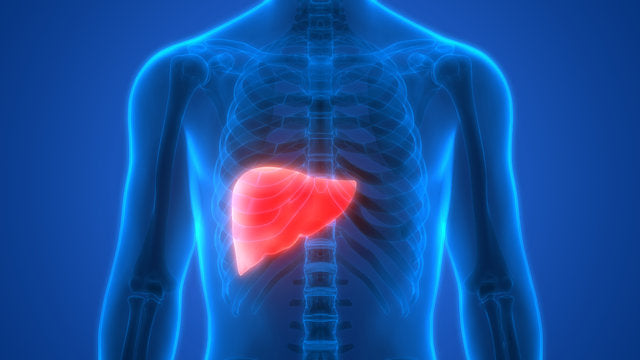
A Closer Look at Trace Minerals and Liver Physiology
ESTIMATED READING TIME: 7 MINS
The liver is a powerhouse organ, performing over 500 critical functions such as detoxification, metabolism, and nutrient storage. Modern lifestyles, including poor dietary habits and exposure to environmental stressors, can challenge the body’s ability to maintain optimal liver function. Trace minerals—essential nutrients often lacking in today’s diets—play a key role in supporting the liver’s natural processes. Super Good Stuff’s Liver Recharge is a powdered trace mineral supplement designed to provide these vital nutrients in a bioavailable form. This blog explores the science behind trace minerals and their relationship to liver health, offering an educational foundation for understanding products like Liver Recharge.
The Role of the Liver in Health
The liver filters blood, metabolizes nutrients, produces bile, and regulates various biochemical processes. Its ability to detoxify harmful substances and regenerate damaged cells makes it uniquely resilient. However, factors such as soil depletion, processed foods, and environmental toxins may reduce the availability of trace minerals needed for these functions. This blog examines how trace minerals contribute to liver physiology, providing context for supplements aimed at supporting nutritional balance.
Product Overview: Liver Recharge
Liver Recharge is a trace mineral supplement in powder form, intended to be mixed with water (1/3 teaspoon in 4 oz, taken twice daily). It is formulated to deliver a blend of trace minerals that may be underrepresented in modern diets due to agricultural practices and food processing. While this white paper does not evaluate the product’s specific effects, it provides scientific insights into the broader category of trace mineral supplementation and its relevance to liver health.
The Science of Trace Minerals and Liver Function
Key Trace Minerals in Liver Physiology
Trace minerals are essential micronutrients that serve as cofactors in enzymatic reactions throughout the body, including the liver. Below are examples of minerals commonly associated with liver health and their scientifically documented roles:
- Zinc is involved in over 300 enzymatic processes, many of which occur in the liver. Research published in Nutrients (2019) indicates that zinc supports the body’s response to oxidative stress, a factor in liver cell maintenance. Studies also suggest that zinc is critical for metabolic processes tied to liver function.
- Selenium contributes to the production of glutathione, a key antioxidant in the liver. A 2016 study in Hepatology found that selenium is associated with healthy liver enzyme levels and protection against oxidative damage, highlighting its importance in cellular defense mechanisms.
- Magnesium aids in bile production and enzymatic activity. According to a 2020 review in The Journal of Clinical Medicine, magnesium supports metabolic homeostasis and may play a role in maintaining liver integrity under stress.
Detoxification and Regeneration Processes
The liver detoxifies substances through a two-phase process: Phase I (oxidation) and Phase II (conjugation). Trace minerals act as cofactors for enzymes like cytochrome P450 and glutathione-related systems, which are essential to these phases. Research underscores that adequate mineral levels support the liver’s natural ability to process and eliminate toxins.
The liver also regenerates its cells (hepatocytes) to maintain functionality. A 2018 study in Liver International noted that trace minerals are involved in cellular proliferation, suggesting their importance in tissue repair. These processes illustrate why trace minerals are a focus of nutritional science.
Modern Dietary Challenges
Agricultural practices such as monocropping and soil depletion have reduced the mineral content of food over time. A 2017 analysis in The Journal of Nutrition documented declines in trace minerals like zinc and selenium in crops, potentially impacting dietary intake. Supplements like Liver Recharge are designed to address these gaps by providing trace minerals in a concentrated, bioavailable form.
Educational Insights on Liver Support
Trace minerals are integral to the liver’s natural functions, including its role in detoxification and cellular repair. While the body maintains these processes independently, scientific literature suggests that adequate mineral intake supports overall wellness. Products like Liver Recharge align with this principle by offering a source of trace minerals to complement dietary efforts. This blog does not claim specific benefits for Liver Recharge, but rather highlights the established science behind its foundational ingredients.
Limitations and Compliance
Under DSHEA, dietary supplements cannot claim to treat, cure, or prevent diseases. This white paper avoids such claims, focusing instead on general scientific knowledge about trace minerals and liver function. The specific formulation of Liver Recharge is proprietary, and its effects have not been evaluated in clinical trials cited here. Readers are encouraged to consult healthcare professionals before adding supplements to their routines, especially if they have existing health conditions or take medications.
Additionally, the term “detoxification” refers to the liver’s natural process, not an enhanced effect from supplementation. Experts at Johns Hopkins Medicine clarify that supplements support—rather than accelerate—this inherent function.
Conclusion
Trace minerals play a vital role in supporting the liver’s natural processes, from detoxification to cellular regeneration. Liver Recharge by Super Good Stuff is positioned within this scientific context, offering a blend of trace minerals to address potential dietary deficiencies. This white paper provides an educational overview of the relationship between trace minerals and liver health, empowering readers to make informed decisions about nutritional supplementation. While not a substitute for medical advice or treatment, products like Liver Recharge reflect a growing interest in leveraging science to support wellness.
References
- Information is drawn from peer-reviewed sources such as Nutrients, Hepatology, and The Journal of Clinical Medicine, as well as general knowledge about trace minerals.
